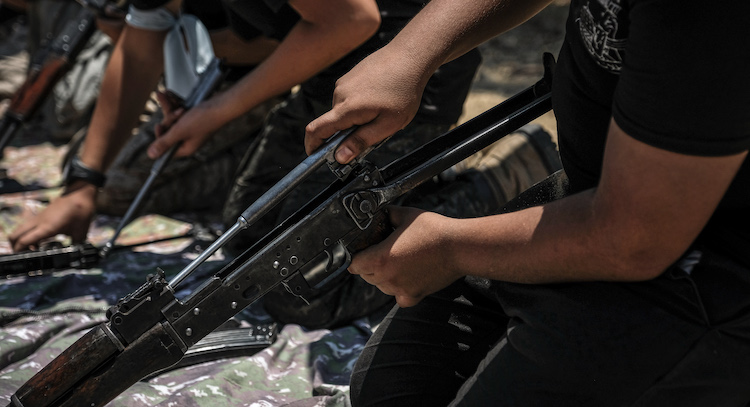Amid all the talk of Hamas stealing food aid, it’s worth also noting that Hamas takes a variety of other regular actions that exacerbate poverty and food insecurity in the enclave. Hamas is the government of Gaza, and it is an extractive entity: It takes what Gaza makes (or gets).
The BBC, to its credit, today covers the issue of Hamas’s weakness. Its reporting expands on what we know to include the wider context of what Hamas is still able to do and how it is able to do it.
For example, the BBC spoke to a few Hamasniks who received payments of $300 in the past week. That puts them “among tens of thousands of employees who have continued to receive a maximum of just over 20% of their pre-war salary every 10 weeks.”
Not only are they on minimal salaries, but their money has been devalued by inflation, which Hamas itself is responsible for. Food costs more because Hamas is hoarding it and reselling it at high prices while simultaneously cutting its ranks’ pay.
There’s another hidden tax, too. The Wall Street Journal reported in April on the sorry physical condition of cash in Gaza. In response, money-patchers have cropped up, repairing bills for a fee. But according to the BBC’s latest reporting, it’s too late to save a lot of that cash.
“I received 1,000 shekels (about $300) in worn-out banknotes — no trader would accept them,” one employee told the outlet. “Only 200 shekels were usable — the rest, I honestly don’t know what to do with.”
So in reality, instead of getting paid one-fifth of their salary, the fighters are receiving (at least in instances such as the above) one-fifth of one-fifth of their salaries.
How do they even get paid? That has become a complicated task thanks to the IDF’s targeting of key nodes in Hamas’s financial team. To even get the (mostly ragged) bills, Hamas employees have to channel their inner secret agent. First they receive an encrypted message to meet someone for tea at a specific time and place. Once there, they will be approached by someone with an envelope. The handoff is made in silence and the two go their separate ways.
Says one Hamas bureaucrat: “Every time I go to pick up my salary, I say goodbye to my wife and children. I know that I may not return.”
Surely the currency deterioration isn’t universal, and there must be Hamasniks who aren’t paid by James Bonding their way to an alley. But even there, Hamas isn’t off the hook. After all, if some people are getting paid in full or getting all usable bills, where is that money coming from? In some cases, the answer is: Someone has got to have access to Hamas’s prewar stash of cash amounting to hundreds of millions of dollars.
Which is a reminder that Hamas planned for this war. The group prepared stockpiles of money, food, and supplies from the very beginning, knowing when and where they were going to pull the trigger on the operation.
Hamas’s stores of food and money can’t last forever, of course, even if they get regular infusions from humanitarian aid deliveries. But think about how many Palestinian lives could be saved by Hamas’s cash reserves, its food, its medical supplies just sitting around in a tunnel. It isn’t just that Hamas swipes the food that comes in via crossings and then resells it. Hamas has always had a rainy day fund. And it sits there while Hamasniks watch people die.
That the destruction and disbandment of this ghoulish terror government isn’t everybody’s first priority remains baffling. That European states are flirting with rewarding them with a state is a genuine scandal.


















